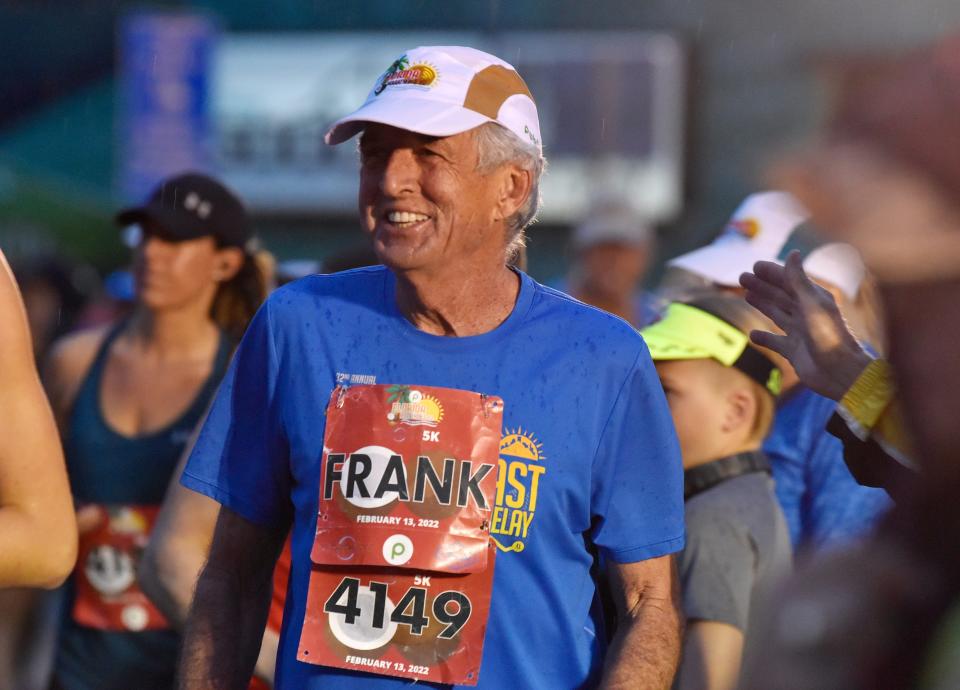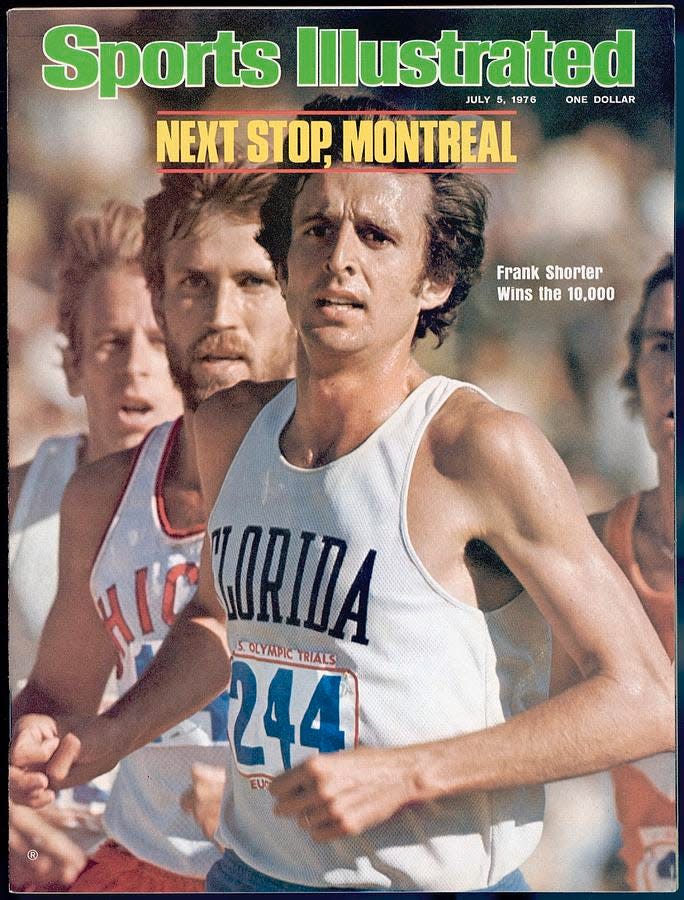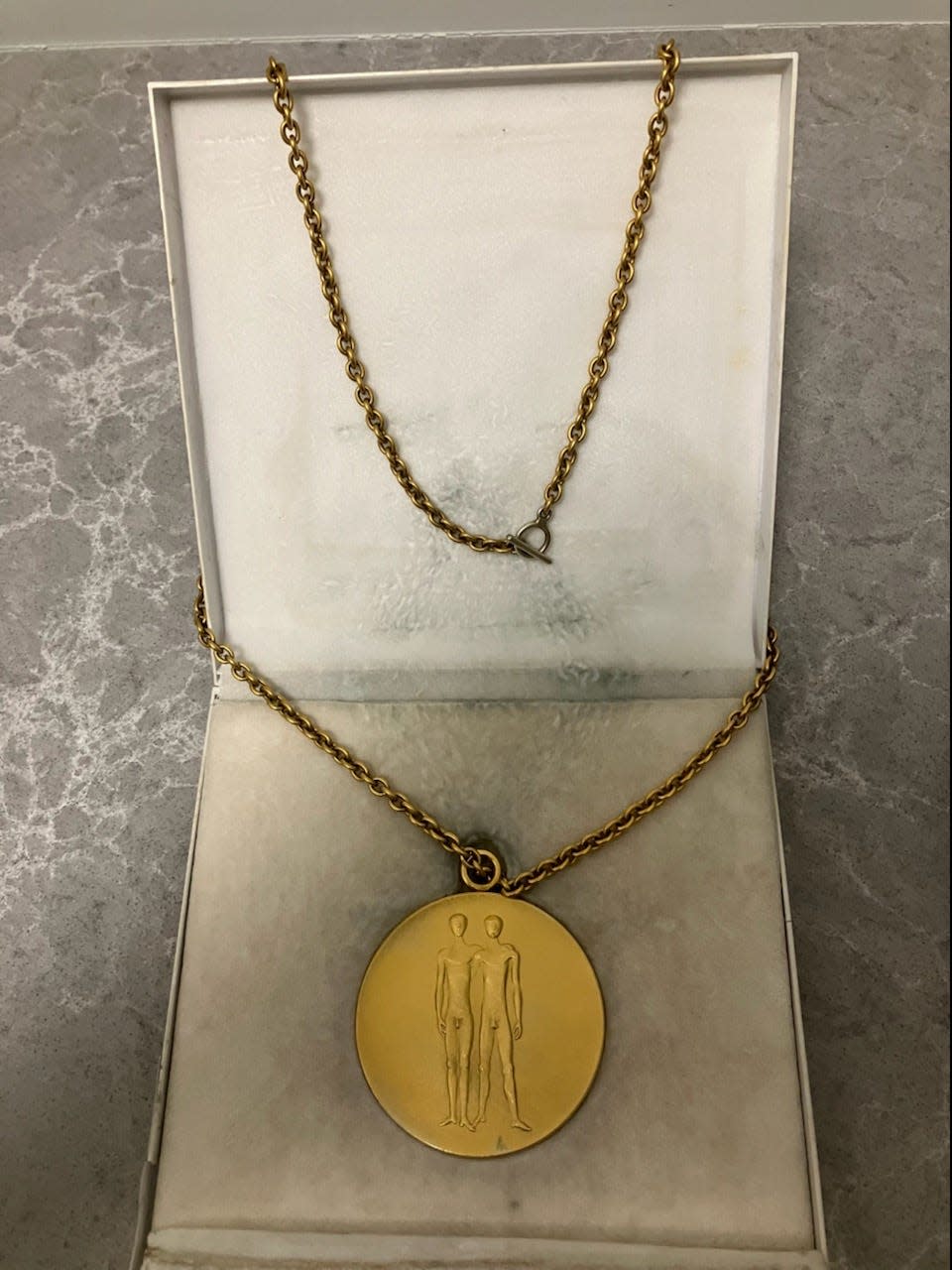Frank Shorter talks about time in Gainesville on 50th anniversary of his 1972 gold medal

Approaching the 50th anniversary of his win in the marathon at the Olympic Games in Munich, Germany, on Sept 10, 1972, former Gainesville resident Frank Shorter remained sensible about his accomplishment.
He won the first gold medal in the marathon by an American since 1908 and was only the third American to win since the inception of the Olympics in 1896. Shorter did it representing Gainesville's Florida Track Club.
“Once I crossed the finish line, the first thought in my mind was ‘I did it right.’ In other words, the strategy had worked," Shorter said recently. "It wasn’t ‘Oh, I’ve won and all of this is going to follow.’ It was ‘Ok, that was how I was going to do it, I gave it a try and it worked.’ So that was the satisfaction of meeting that short-term goal and doing everything you could to do it.”
David Whitley: In honor of Fourth of July, celebrate the greatest sports country on earth
A reunion celebrating Shorter’s and the Florida Track Club’s accomplishment will be held Jan 13-16, 2023, in Gainesville.
Frank Shorter's road to Gainesville
Shorter, who now resides in Falmouth, Mass., and will turn 75 on Oct. 31, found his way to Gainesville by a chance meeting.
“When I was at Yale, we competed in the Florida Relays. There, I ran an open two mile and was beaten by a straightaway or half a straight away by Jack Bacheler, who was running for the Florida Track Club,” he recounts.
He and Bacheler warmed down together after the race and spoke a bit. A relationship and familiarity was formed.
After graduating from Yale, Shorter did a brief stint at medical school in New Mexico and training in El Paso, Texas. He then made his way back to Gainesville in 1970. Shorter sought out Bacheler who was an Olympic finalist in the 5,000 meters at the 1968 Olympics. Before the final, Bacheler was sick and was not able to compete.
“Jack was the first person I knew of who was able to train and go to graduate school and be successful,” Shorter said of Bacheler who studied and earned a PhD in entomology from the University of Florida. “And he was married and had a kid!”
Shorter, who had just married his first wife Louise in 1970, had always sought out mentors. So after speaking with Bacheler, the decision was made to move to Gainesville. He enrolled in the law school.
“Within six months, Frank who had joined us for our afternoon workout, adapted to the training regimen very quickly,” said Bacheler, who now lives in Clayton, N.C.
Though Bacheler was the reason for his choosing Gainesville, Shorter said UF cross country and track coach Jimmy Carnes was instrumental in helping him find a place to stay his first week and subsequent years in Gainesville while attending school.
“He gave me a key to the fire exit door of the football locker room so I wouldn’t have to go through the front entrance. I stayed there for a week or two," Shorter recalled. "One day I remember approaching the door to enter and before I could get the door open, John Reaves [then UF quarterback] came out and hit me with the door. I was bleeding from my nose all over the place."
Shorter scheduled his workouts carefully around his school schedule. He had a break between classes in the morning and would complete his “morning run” between morning and afternoon classes. After his last class ended at 3 p.m., he would go run his afternoon run with the Florida Track Club group, led by Bacheler.
How the FTC grew into a training mecca

The Florida Track Club was co-founded by Bacheler and Carnes. Bacheler created the iconic logo that had the word Florida across the top and an orange underneath that was printed on the team's singlets and used in competition. The “FTC” as it was known was unique and became very competitive at the national and international level.
Bacheler and Shorter won national cross country, road race and track races making Gainesville a training mecca for the top runners in the nation and world.
“You go where there were good people. There was no pretense about it. I enjoyed that. Up here in the northeast, I knew what pretense was. That’s the way we were. I think a lot of us had the same sort of feeling. Marty Liquori and Jack obviously felt that way. We got to meet people like John Parker...” Shorter says of the training partners who are friends to this day. “Byron Dyce was also part of our group. He could have gone anywhere, but he chose to come to Gainesville. There was a blend of people. We all wanted to be there.”
The goal of the FTC was to have many make the 1972 Olympic track and field team. Shorter and Jeff Galloway, who trained in Tallahassee and competed for the FTC, made the team in the men’s 10,000 meter at the Olympic Trails in Eugene, Ore.
Bacheler did not. He was caught by eventual third placer Jon Anderson in the final straightaway and was disqualified in a disputable interference call by the meet referee. A plan was hatched that Galloway would pace Bacheler in the marathon seven days later. The plan worked as Shorter won the race in 2:15:57.8 and Galloway and Bacheler tied for the third and final Olympic team spot in 2:20.9. Bacheler had earned a spot.
“The memory is how we truly worked together," Shorter said. "The goal was to have all of us make the Olympic team. That was the primary goal. You hoped it would be all three. And we never thought any differently. Our performances showed that there was that possibility and we did it.”
The Olympics in Munich

Munich was Shorter’s birthplace; his father was stationed there in the Army. When he arrived there at age 25, Shorter turned his focus to the 10,000 meter preliminaries and final competition on Aug. 31 and Sept 3.
Shorter’s first Olympics was marred with tragedy and triumph.
Shorter set the American record in the preliminaries of the 10,000 meters in 27:58.2 on Aug. 31. Then in the final on Sept. 3, he lowered the record to 27:51.31 for fifth place.
“I was never really in that race. I was just hanging on,” says Shorter who watched Finland’s Lasse Viren fall, get up, catch the leaders and then go on to win the 10,000 meter title in an Olympic record time of 27:38.5.
Then tragedy struck. On Sept. 5, Palestinian terrorists infiltrated the Olympic Village and took some Israeli athletes hostage and killed two others. Shorter was awakened by the commotion that night some 100 yards from his bunk on the balcony.
“We bore witness to it all from our room,” says Shorter. “Steve Prefontaine was fluent in German and interpreted the TV reports that were coming from a small TV we had in our room. We thought that there would be no competition after that.
“We saw the helicopters fly over our dorm quarters. We knew something was up. As the helicopter flew off, I turned to my friend and teammate, Kenny Moore and said ‘This isn’t over.’ I had a bad feeling about it.”
Later, all the hostages were killed at the airport in a botched rescue attempt and a memorial was held two days later. There, it was announced that the games would continue with a day delay.
As Shorter left the memorial service, he and Moore discussed the upcoming marathon. Moore decided to honor the Israelis with his participation. Shorter told Moore that he would forget, not think about what happened before, during or after. He wanted his thoughts to be his own, not held hostage by the terrorists and their motives and acts.
Shorter lined up for the marathon only having run four marathons. He was a novice and not favored. Ron Hill of Great Britain and Derek Clayton of Australia had both run under 2 hours, 10 minutes — two minutes faster than Shorter ran in winning the Fukuoka Marathon for the first time in 2:12:50.4 on Dec. 5, 1971. Though Fukuoka was regarded as the de facto world championships at the time, Shorter went unnoticed by the media.
“That was an advantage for me,” he said. “I didn’t have any pressure.”
Between the ninth and 10th mile, Shorter ran a 4:33 mile to break away from the field. He was off on his own.
UF Assistant Track and Field Coach Roy Benson had taken the year off from his duties to coach the Philippines track and field team and was there in Munich for the marathon race. He was part of a Peace Corp coaching program. Jimmy Carnes granted him the year long sabbatical with the caveat that Benson return to the program after that year. Benson secured a bike and rode along through the throngs of people lining the course to provide updates to Shorter.
“Yes, he was key," Shorter says of Benson. “At 15 to 16 miles he let me know I had a minute and 12 second lead. Then he was able to get to the 19- and 20-mile marks and give me another update. I did the math in my head. I was running 5 minute miles and the others would need to run 4:48 to catch me. I knew that no one could do that, and I just needed to hang on.”
His victory margin was by more than two minutes and his time, 2:12:19.8, was a personal best time. Kenny Moore was fourth and Bacheler ninth in 2:15:39.8 and 2:17:38.2. It was a great showing for the Americans.
For Shorter the gold ceremony was the first time the victory really sunk in.
“On the victory stand, my first thought and this goes back to Billy Mills and Bob Schul who won gold medals in the 1964 Olympic Games. I had watched as a senior at Mount Hermon School, in Gill, MA. It showed the world that Americans could endure. We weren’t just a team of sprinters or field event men. I felt pride there," he said.
He had not thought about winning. "I get into a situation and I don’t expect something. I can wait and see what happens and then I can get involved in whatever is going on. I never thought before what I was going to do if I won..."
After the ceremony, Shorter went to dinner with friends. There were no press conferences or interviews. He and Moore did a training run the next morning. He returned to Middleton, New York, for a celebration. Then returned to Gainesville for school and training again.
“I did what most didn't," Shorter said. “I decided to continue training and not go for the endorsements, sponsorships and retirement route."
Shorter and his wife moved to Denver after he finished law school in 1974.
“She enrolled in graduate school to pursue a library science degree at the University of Denver,” he says. “She had supported me through law school, so it was my turn to support her.”
As for Gainesville, Shorter still visits: “The last time I was there in February, I showed my wife, Michelle, around the campus and met with the Florida Track Club members. It was great to see old friends and share memories of my time in Gainesville.”
For the January reunion in Gainesville, a meet and greet will be held at First Magnitude Brewery Jan. 13 in the evening. Another event is planned on Jan. 14 at Cypress and Grove Brewery. All events are open to the public at no cost. For more information, contact Ricky Quintana at ricky.quintana7@gmail.com.
This article originally appeared on The Gainesville Sun: Olympian Frank Shorter remembers his time training in Gainesville

